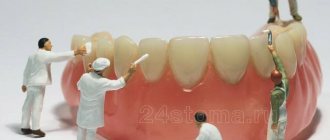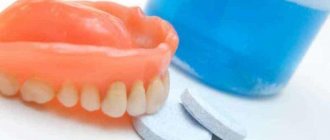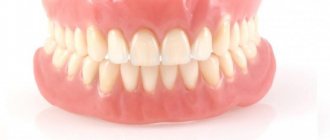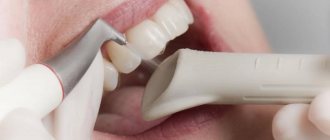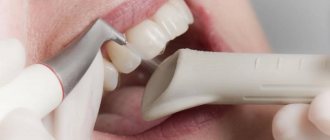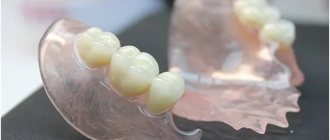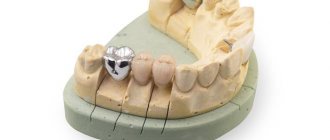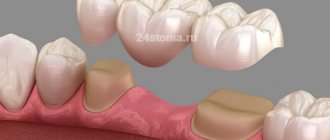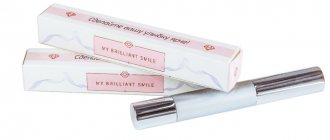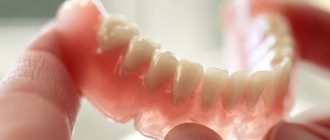Several decades ago, removable dentures were called “teeth in a glass” because they had to be removed from the mouth at night and placed in a container of water. This was due to the need to maintain in good condition the manufacturing material that was used at that time to create such structures. Let's talk about whether anything has changed since then and whether it is necessary to take off dentures at night now.
How long does it take to get used to removable dentures?
On average, 30 days. At the beginning of use, removable dentures feel like a foreign body and can cause discomfort. They can interfere with the production of sounds (diction), cause increased salivation, changes in taste and temperature sensations, and difficulty biting and chewing food. Sometimes, when applying removable dentures, the urge to vomit may occur. It is also possible that the dentures do not adhere satisfactorily, or food debris gets underneath them, or biting the cheeks, lips, or tongue. All these phenomena decrease by the end of the first week of wearing the prosthesis and disappear after 3-4 weeks. After an adaptation period, the patient already feels more comfortable with prostheses than without them.
The main condition for quickly getting used to prostheses is their constant use. The rules and recommendations below will help you shorten the adaptation period.
What determines the service life of a crown?
- The service life and the need to replace the structure greatly depend on the accuracy of manufacturing at all stages. Precision work means that the crown fits to the tooth without gaps, without steps, without voids, oral fluid and food do not get under it, the gums around it do not become inflamed, it is no different from the “native” tooth. It is the precision of manufacturing that determines the quality of work, and therefore is the key to a long service life of the crown. For example, I had to deal with a situation where the crown was made only a year ago, and upon examination, strict indications for its urgent replacement were revealed (due to poor quality, namely inaccurate manufacturing). And vice versa, when examined, the crown meets all the requirements, all parameters are normal, there is no need to replace it, and it has been standing for 10 years (which means it was manufactured very accurately and in a timely manner).
- We have repeatedly mentioned that accuracy, and therefore quality, is at the forefront. If we take quality as a given, then the material and method of fixation come to the fore. So, the service life also depends on the material from which the crown is made and, accordingly, on the method of fixing it to the tooth . Classic metal-ceramics and zirconium dioxide-based crowns are attached to a special “cement,” that is, an intermediary between the crown and the tooth, and do not enter into a “chemical” bond with either this cement or the ground tooth. Namely, this cement is “destroyed” and “washed out” over time, leading to a violation of the seal of the entire structure. Crowns based on lithium disilicate (also called “E-max”) are fixed without an intermediary: using the adhesive (“glue”) method, that is, they are glued to the tooth tissue, which leads to a very strong connection between the crown and the tooth. Accordingly, the service life of such structures is longer than the 5-7 years described above, which means that a crown change will not be required soon.
- In addition, the service life is greatly influenced by the condition of the tooth for which the crown was made. If a patient hesitates for a long time to adequately restore a damaged tooth, he comes for prosthetics at an untimely rate, in particular when the tooth is destroyed by a carious process to the level or below the level of the gum, becoming “soft” and unreliable. In such conditions, the doctor is no longer able to make an accurate marginal fit; such a structure will never be completely sealed, which means the tooth under such a crown will be destroyed. In such conditions, neither good materials nor the method of fixing the crown will help. And if the doctor nevertheless undertakes the restoration of such a tooth, this will be the last crown on it, since it will be impossible to repeat the restoration.
Important! Dear patients, do not delay the restoration of damaged teeth, do not deprive yourself of the opportunity to save your own tooth faster, more reliably and cheaper!
By clicking on the “Make an appointment” button, I consent to the processing of my personal data.
I have read and agree with the conditions for processing personal data set out on the website ds-chocolate.ru.
Consent to the processing of personal data
How to quickly get used to new dentures
- Immediately after submitting the finished work in the dentist’s chair, learn how to remove and put on removable dentures yourself. At home, practice again, first in front of a mirror, then without it.
- Before applying, soak removable dentures in water or use a fixative.
- For the first one and a half to two weeks after the application of dentures, they should not be removed from the mouth, even at night. Take them out only for cleaning and oral hygiene.
- To reduce the gag reflex, try sucking the candy by placing it towards the roof of your mouth and holding it in this position with your tongue.
- Rinse your mouth often with warm water (8-10 times a day) or drink hot tea.
- Reading aloud in a calm, relaxed atmosphere for 2 hours helps to quickly restore correct pronunciation. In most patients, diction is restored quite quickly (after 5-6 days)
- For the first 2-4 days of wearing the prosthesis, try to eat soft foods and not load the prosthesis until you fully adapt to it. Try not to bite with your front teeth. Chew your food slowly and thoroughly.
- Chew food with your side teeth at the same time (left and right at once). Cut food into small pieces. Introduce more fruits and vegetables into your diet (this will allow you to switch to your usual diet earlier).
Complications in case of untimely replacement
If you visit the dentist irregularly or endure pain for a long time, then dangerous complications are likely to occur, such as gum loss, local periodontitis, marginal periodontitis, tooth decay, the appearance of cysts and granulomas at the roots, peri-implantitis - inflammation around the implant. All these conditions are fraught with removal of the root/implant and prolonged recovery (if the bone was severely infected).
PROSTHETIC PROSTHETICS WITH 4 STRAUMANN IMPLANTS “teeth in 1 day” - RUB 220,000. until January 15, 2022!
Complex implantation using ProArch technology (Switzerland) with immediate loading on the day of surgery!
Call now or request a call
“I somehow missed the moment that the crown began to wobble, so I didn’t go to the dentist. But a few days later, during lunch, I felt that it had fallen off altogether. Almost swallowed it! I thought it would be possible to glue it in place. But the prosthetist said it was too late, the root was cracked and needed to be removed. Here. So now I’ll have to make a bridge or an implant. Not decided yet". Sergey, review from the website stomatology.rf
What are the main rules when using removable dentures?
Dentures must be clean. After each meal, they should be removed from the mouth and washed thoroughly with soap and water.
Removable dentures should be protected from mechanical and chemical damage, as well as from exposure to high temperatures. If cracks or breakages appear in a removable denture, you cannot use it; you must consult a doctor for repairs.
Do not take breaks from wearing a prosthesis for more than one and a half to two weeks, because... this can lead to an initial discomfort that can make it difficult to fit the prosthesis exactly into place. As a rule, if a prosthesis is not used for more than a month, it becomes unusable and a new one needs to be made.
What are dental crowns?
The destruction of teeth in the oral cavity makes it impossible to perform their main function - grinding and chewing food. To restore the functional purpose of a partially or completely deformed tooth, a prosthetic procedure is used. It involves the installation of crowns, which are caps fixed to the supporting part.
The root of a damaged tooth can serve as a support, but only if it is fully suitable. If not only the upper part is deformed, but also the root has significant damage, then an implant is used.
The crown is made in a dental laboratory based on previously taken impressions. After this, it is attached to the root and becomes a full-fledged tooth replacement. With the help of crowns, chewing and speech functions are restored, in addition, a person gets the opportunity to smile freely.
What is prosthesis correction and when should it be done?
After applying removable dentures in the oral cavity, as a rule, pain appears in some areas underneath. This is due to the inevitable gradual subsidence (pressure) of the removable denture on the mucous membrane. This factor cannot be fully taken into account when designing these orthopedic structures, therefore, correction is necessary to eliminate unpleasant sensations. It consists of “undermining” the dentures in those areas where it presses on the oral mucosa.
The first correction must be carried out the next day after the start of using dentures. The next 3-4 corrections must be carried out over a period of one and a half to two weeks as necessary. You may need more visits to the dentist after completing your work (up to 10).
In case of severe pain, you need to remove your dentures and put them in a special container or glass of water. Before going to the doctor for correction, you must wear dentures and walk around with them for at least 3-4 hours. This will allow the doctor to see a clear imprint on the mucous membrane and correct only the place that is rubbing the gum. Bringing a denture in your pocket and pointing your finger in your mouth is useless. In removable dentures, every centimeter, and sometimes even a millimeter, of the supporting surface is of great importance. If the correction is inaccurate, the fixation of the prosthesis may be impaired. This is exactly what happens if you try to grind or file dentures yourself. After correction (adjustment) of removable dentures, you must not use them for 1 day. During this period (during the healing period of the namin), it is advisable to rinse your mouth and make baths (hold the solution in the mouth at the site of the namin) with herbal decoctions. Use a decoction of chamomile flowers, oak bark, etc. For example, take 0.5 tablespoons of dry oak bark, brew in one glass of boiling water, cool, apply the decoction 3-5 times a day. You can also use medicines, for example Kamistad gel, sold in pharmacies.
Feel free to visit your dentist for adjustments. Removable dentures, even if they are made in the most careful manner, require correction. Even if you do not experience any pain or discomfort, you should visit the dentist for an oral examination.
WARNING : Do not attempt to straighten dentures yourself with a file or any other tool. This can lead to breakage of the prosthesis and disruption of its fixation. Moreover, after such “repairs” it is no longer possible to do anything with the prostheses in the clinic. As a result, all that remains is the manufacture of new orthopedic structures.
Important questions about dental implants
Will I get natural and beautiful teeth? It seems to me that the crowns will be noticeable in any case.
Implants are artificial roots for crowns, dentures and other orthopedic structures.
Thanks to them, the teeth feel like real ones, receive adequate physical activity, and do not move. Installation of a bridge does not require damage to adjacent healthy teeth. As for the aesthetic side of the issue, not a single crown or prosthesis is finally attached before the patient accepts its appearance. We offer each client an individual solution, taking into account requirements and wishes, trying to choose the ideal shape and color scheme. The dentist tries on the finished crown or prosthesis and only after the patient’s consent securely attaches it to the implant.
How many doctor visits are required?
It all depends on the individual factors of the clinical case. As a rule, one consultation is enough to decide on the type of operation and its volume. Then you need to take tests and accurately determine the date of installation of the implant, the type of anesthesia and many other nuances. The actual surgical intervention is performed once, very rarely twice. Then after a few days the situation is controlled, and after 10 days the stitches are removed. The healing period does not require visits to the dentist, but only if it progresses adequately.
Can I exercise after getting implants?
In general, it is not prohibited to move without overload, but you need to wait at least 2-3 weeks after the operation. It is recommended to discuss the issue with your dentist in advance to determine the acceptable type of sport and optimal loads.
What care is required for crowns installed on implants?
Care for artificial teeth in the same way as before for real teeth. No additional tricks are required. Choose a suitable toothbrush and toothpaste, clean the crevices between the teeth and the junctions with the gums. Use dental floss to remove food debris between your teeth. Do not forget to visit the dentist 1-2 times a year for preventive purposes.
Can installed implants cause an allergic reaction?
There are no known cases of allergic reactions to titanium structures in medicine. This material has long been used in traumatology, dentistry and other industries, as it is not rejected by the body. Titanium implants are additionally covered with protective layers and perfectly imitate a real tooth root. Therefore, the occurrence of allergies is impossible.
Will I have any pain after surgery?
The presence and severity of pain depends on the individual characteristics of the body. Some patients do not require analgesics the very next day after surgery. However, pain will definitely occur if you refuse to take medications prescribed by your doctor according to the regimen. You can find a list of them and admission rules in the NB-After card. The necessary medications are in a special white bag.
Can implantation be performed on minors? What age is considered optimal?
Implantation is permitted and is carried out only after the formation of the osteoarticular apparatus of the jaw is completed. As a rule, this occurs by the age of 18, but in individual cases it is delayed for longer periods. Therefore, implantation is definitely not performed on minors. And the possibility of its implementation in older patients is determined using radiographic examination.
When may it be necessary to restore alveolar ridge bone tissue?
In 90% of cases, patients require bone grafting because the jawbone is thinned and is not suitable for implantation. There are plenty of reasons for this: long-term absence of a tooth, low loads on the bone, inflammatory processes, prolonged wearing of any dentures (only implants stop the process of bone resorption).
There is no need to be afraid of bone grafting, because modern technologies have eliminated any risks associated with it. In addition, the restored bone volume guarantees adequate fixation of the implant.
How long will the implant last?
A correctly installed high-quality implant is an ideal imitation of a tooth root. It withstands chewing loads, does not become loose, and does not become less reliable. Implants do not have to be replaced throughout your life, so they are the optimal solution for restoring teeth. It is better to place an implant once than to constantly change removable dentures.
Will I have to go without teeth while the treatment and healing process takes place?
Of course not. If you wore a removable denture before getting an implant, you can put it back almost immediately after surgery. In other cases, the doctor individually selects a temporary prosthesis. Sometimes removable temporary structures are installed for long-term wear. They are attached directly to the implant.
I had surgery and was sent home. What should you do right away?
The first few hours after installation of the implant, you should cool the cheek externally to prevent or at least reduce the severity of swelling. To do this, prepare ice cubes or cold compresses. Recommendations for the postoperative period are written down in the NB-After card. Read it carefully and follow the instructions exactly.
What are dental crowns made of?
Most patients get structures made of metals coated with ceramics to match the color of the teeth. Such structures are strong, reliable and indistinguishable from real teeth. Only when exposed to direct rays of light will the metal inside be visible. Solid ceramics are also used for crowns without the use of metals. It gives the perfect aesthetic appearance to your smile. It is used for both individual crowns and bridges.
What to expect from a consultation?
An initial consultation with a dentist is not something super special. The doctor will assess and discuss your situation, conduct an examination of the oral cavity, suggest the best ways to solve the problem, and prescribe a series of studies. Come to your consultation with old dental photographs, if available. Bring all medical documentation. Don't forget to tell your doctor about your chronic diseases and list the medications you take regularly. Be sure to report any allergies to medications. Don’t be afraid to ask provocative and simply clarifying questions, don’t be afraid to demand certificates and licenses.
I want to get implants, but in the future I plan to lighten my teeth and improve their aesthetic appearance. What should I do?
Feel free to contact our specialists with this problem. Yes, implants are matched to the color of the patient’s tooth enamel. However, our doctors can lighten the teeth using special plates called veneers. They will not only improve the color of your teeth, but also correct cosmetic defects in their shape.
Should smokers get implants?
Previously, smokers were dissuaded from undergoing implantation, since it cost a lot of money, and the result quickly returned to zero due to constant smoking. Modern technologies and materials reduce the risk for smokers and the long-term service life of implants and crowns on them is reduced only with insufficient oral hygiene. If you are concerned about the appropriateness of implantation, discuss this issue with your dental hygienist. He will select individual procedures.
How and when are crowns placed on implants?
In modern conditions, permanent crowns are placed after implants have healed, which occurs within 3-4 months. Duration varies slightly. The process itself consists of: removing temporary crowns, removing a sealed plug, making an impression and shaping the gums using special caps. The dental laboratory creates an individual crown for each patient. Then the fitting takes place and only after this the crown is securely fixed. It happens that you have to adjust the size and shape of the crowns several times so that they do not differ in any way from real teeth.
Are implants placed after tooth extraction?
Certainly. This treatment option is considered one of the most optimal, since the bone tissue does not have time to dissolve. With this type of implantation, bone grafting is often not required. The titanium structure is fixed into the socket from which the real tooth was removed. Further engraftment and further fixation of the crowns proceed as standard.
Do not confuse implantation after tooth extraction and implantation with immediate loading.
What is immediate loading implantation?
In rare cases, when the patient does not undergo bone grafting or, according to individual indications, the operation is performed with immediate loads. That is, a high-quality permanent crown is fixed to the implant immediately after its installation. There is no need to wait until engraftment occurs.
Do I need to remove removable dentures attached to implants before going to bed?
No need. Any crowns or complete removable dentures are very securely fixed to implants, so there is no need to remove them at night. People usually remove their dentures before going to bed to prevent them from shifting and blocking their airways. Dentists always warn patients about this risk. However, technologies for fixing prostheses on implants have eliminated this problem. Therefore, you can sleep peacefully in dentures without risk to health and safety of structures.
How do implants differ from each other in terms of quality?
Implants come in different types and types, depending on the method of implantation. However, the most optimal, safe and predictable option is the classic installation of titanium structures. In appearance, the patient will not be able to distinguish one implant from another, since they are all similar to an ordinary screw. But professionals know that there is a difference in quality.
Modern Nobel Biocare implants are manufactured using a special coating that accelerates bone growth and implantation of the structure. Our clinic only uses implants with a coating that is invisible to the human eye. We have been using Nobel Biocare implants with TI-Unite surface for over a decade and have never been disappointed with their quality.
Is implantation performed under general anesthesia? What kind of anesthesia is used for dental implantation?
No, general anesthesia is not performed. There is no pain or discomfort at all when implantation is performed under local anesthesia. The patient may feel slight vibration or pressure, but no pain. For those people who are terrified of surgical interventions and want to undergo general anesthesia, it is recommended to consult with the treating dentist. He will assess the possible risks and help the patient make the right decision.
I want to change the prosthesis, which is fixed to the implant. Can this be done?
Yes. Whenever. Any dentures or crowns that are attached to implants can be replaced or updated. Moreover, a single implant can be converted into a support for a bridge at any time. The designs used in our clinic are compatible with various individual orthopedic solutions.
Are there diseases for which implantation is prohibited?
There are no specific diseases that would become an obstacle to implantation. However, there is such a thing as the general condition of the patient. If you have serious chronic diseases and they are decompensated, there is organ failure, then no one will perform an operation on you. Only after the condition has stabilized.
When contacting an implantologist to install titanium structures, be sure to inform him about the presence of any pathologies in the body. The doctor will be able to prescribe additional medications and eliminate possible risks. Do not hide the characteristics of your body from the dentist, because this will only increase the chance of an unfavorable outcome of treatment.
Is implantation performed in patients with diabetes?
Yes, it is carried out. However, only after specially corrective treatment aimed at achieving compensation for the patient’s general condition. A similar adjustment can be made in our clinic. Patients with decompensated diabetes mellitus, high sugar levels, and severe complications first normalize their condition and only then can count on implantation. Such precautions are due to the fact that in patients with high sugar levels, wounds heal poorly and the risk of infection is increased.
Can the implant become inflamed and what should I do?
Yes, indeed, in the absence of regular oral hygiene or when immunity is reduced, an inflammatory process can occur. If you consult a dentist in time, then there will be no problems with his treatment. And with regular preventative visits to the doctor, proper brushing of teeth and a generally healthy lifestyle, there is no need to worry about such a problem.
What complications are there?
Previously, complications did occur and not as rarely as we would like. But modern technologies for installing implants and planning surgery make it possible to eliminate all possible risks. The only problem that periodically arises is insufficient fixation of the implant in thinned bone tissue. But the complication, as a rule, is provoked by patients’ refusal to undergo bone grafting. In such cases, the implant is moved under local anesthesia.
I wear a removable denture for the entire jaw, which is constantly moving. I want to install implants, but attach an existing prosthesis to them. Can this be done?
For reliable fastening of a complete removable denture, four titanium structures are sufficient. Your denture can be placed on implants if it is comfortable for biting and chewing and will also provide your jaw with adequate exercise. The fastenings on the implants are so strong that you can immediately forget about displacements. To evaluate the condition of your jaws, your dentures and make the right prosthetic decision, consult with our dentist.
Will I be able to feel which teeth are real and which are not?
No. Implants and modern dentures make it possible to achieve a perfect imitation of natural teeth. You won't feel any difference when you smile, bite into an apple, or chew your food. Only professional dentists can notice the differences, and sometimes only with the help of special equipment.
Are there any dietary restrictions?
No. Implants with crowns, bridges or any other structures attached to them can withstand standard chewing loads without any problems. That is, you should not open a bottle with your teeth - even a natural tooth will not withstand this. But you can eat solid foods like apples or nuts with complete peace of mind.
After surgery, is it preferable to sit or lie down?
We are all accustomed to the fact that after surgery we need to lie down for several days or at least hours. However, in dentistry the situation is the opposite. The horizontal position promotes a rush of blood and lymph to the head, which causes severe swelling and increased pain. Therefore, it is better to spend the first hours after implantation sitting. A short walk in the fresh air will also be beneficial. But don’t overwork yourself – physical activity is prohibited. And try not to bend over.
How soon can you eat and drink?
If you feel thirsty, be sure to drink water at room temperature. However, food and other drinks should be delayed until the local anesthesia wears off. The precaution is due to the fact that the patient may unintentionally damage the wound surface or burn the mucous membranes.
What to eat after surgery?
Eliminate from your diet hard, sticky, floury foods that take a long time to chew or their remains stick to the mucous membranes of the mouth. You can eat light soups, soft cutlets, mashed potatoes. Food should require a minimum of chewing movements. But no yogurt! We also exclude sweets for the first time. You need to eat such food before the stitches are removed, and then you can return to your usual diet.
They say that after installation of implants you should not drink coffee. This is true?
Coffee lovers can safely continue to drink it after implants are installed. You should avoid drinking it, as well as strong teas and highly carbonated drinks, in the first days after surgery. These drinks increase blood pressure, which can cause bleeding.
Is it allowed to chew on the side of the installed implant?
Until the stitches are removed, it is prohibited! Don't be afraid if food gets on the wound. After finishing using it, you should carefully rinse your mouth with warm water each time. However, you need to chew exclusively on the healthy side.
When can I brush my teeth?
A day after surgery, feel free to start brushing your teeth. Moreover, you must start cleaning them to prevent inflammatory processes. When cleaning, walk around the wound surface. It is recommended to use a soft brush so that accidental contact with the bristles on the wound does not damage its edges and seams. The use of irrigators and any mouthwash is prohibited. You should also avoid using an electric toothbrush for a while.
Will there be pain after the local anesthesia wears off?
Yes. The first hours and even days after surgery will help you with a regular analgesic. Take it strictly as directed. The first night after surgery, sleep on a high pillow to allow blood and lymph to flow away from your head. The intensity of the pain syndrome depends on the scope of the operation and the individual characteristics of the body. But gradually the pain will go away. Some clients do not take painkillers within 24 hours after surgery.
Is the wound highly sensitive?
No, and every day the sensitivity decreases. To avoid causing pain or irritation, do not touch the wound with your tongue or fingers. Healing is very fast.
What to do if blood flows?
In the first days after surgery, slight bleeding may persist. It is considered physiological and does not require any action on the part of the patient. Saliva may be slightly pink in color. But the bleeding quickly stops and is almost invisible to patients. If blood flows unexpectedly a few days after the operation, and before that everything was fine, you should immediately consult your doctor.
How long does it take for stitches to be removed?
The date for suture removal is determined individually by the implantologist and depends on the extent of the surgical intervention and some other factors. On average, sutures are removed after one to two weeks.
What do you do after the stitches are removed?
Nothing at first. The next stage is carried out after 5 weeks - the patient is fitted with a gum former. After this, an individual crown or bridge, or a prosthesis for the entire jaw, is made on the implants.
Will the healing abutment interfere?
It will be noticeable in the mouth, but will not cause serious discomfort. Patients usually get used to its presence within a few hours. In addition, they do not wear it for long.
Why is it worth paying attention to the connection between the crown and gums?
This area is the best place for bacteria to penetrate into the gums and even bone tissue. This is accompanied by the occurrence of serious inflammation, which, if the process is neglected and there is no correct treatment, can even lead to the loss of the titanium structure. It is especially important to thoroughly clean the joints in the first year after surgery, when the implant is actively healing.
Are irrigators necessary for proper care?
Until the wound heals and the stitches are removed - definitely not. In general, there are two sides to the coin: irrigators can clean the oral cavity well, but their excessive use can lead to damage to the gums and the penetration of bacteria into it. If you are used to using irrigators, continue, but don’t overdo it! And if you have never used them, then there is no need to start.
Can I use whitening toothpastes?
Yes, but not often. The substances it contains have a very aggressive effect on the crown, which leads to damage to its surface. Consequence: rapid discoloration, accumulation of bacteria, formation of tartar.
Can an unexpected reaction occur if I take medication regularly?
Yes. Cases of cross-reactions are known, so you should list to your dentist all the medications that you have to take on a regular basis. This is especially true for drugs that reduce immunity and blood thinners.
When can I return to work after surgery?
As a rule, you can return to work the next day. But this issue is discussed individually with the dentist. If there is significant swelling, then it is better to sit at home for a day.
How much money will you have to spend?
Our clinic uses a turnkey package implantation system. Its cost will be from 60 thousand rubles . The price of crowns and prostheses is determined individually and depends on the fixation option. In general, the average cost of crowns in Moscow is from 35 to 55 thousand rubles.
What is a batch system?
We offer a fixed price for turnkey implantation, which includes a number of necessary surgical steps. That is, the clinic does not have separate price tags for crowns, anesthesia, and so on. After assessing the clinical case and determining further tactics, the dentist names one amount that will include all stages of treatment. Price includes:
- Cost of the implant itself;
- Cost of the operation, including sterile instruments and consumables;
- Cost of bone grafting and materials for it;
- Applying and removing sutures;
- Control visits to the dentist and necessary examinations;
- The second stage, which includes anesthesia and installation of the shaper.
After this, a crown or prosthesis is selected, which are paid separately.
What is Nobel Biocare?
Nobel Biocare designs are high quality implants. During their production, starting with the supply of materials, each stage is certified and strictly controlled. The design of the implants is clearly calibrated, and their range will allow you to choose the best option even in the most difficult clinical situations. The implants have a specific TI-Unite surface, which is similar in composition to the dentin of natural teeth. This allows for faster healing and increased reliability of implant fixation in the bone.
I have bruxism. Is it possible to get implants or does it make no sense?
Can. In addition to the fact that the implants can withstand standard chewing loads, and the crowns are made of very durable materials, patients with bruxism are recommended to use special mouth guards. They will help reduce stress on your jaws, teeth and joints. Consult with our dentists how best to solve the current situation.
What care is required for dentures and implant crowns?
Care for bridges, crowns, and other dental restorations just as you would for natural teeth. Clean them twice a day, use dental floss, and periodically visit the dentist for preventive purposes. The only point: when brushing your teeth, pay special attention to the spaces between the teeth and the places where the crown comes into contact with the gum.
Is it possible to perform implantation with increased pressure?
Hypertension is a very common pathology. If your treatment regimen for the disease has been completely adjusted, and your blood pressure numbers remain in the same range, then there will be no problems.
How to care for your gums after having a retainer installed?
A short time should pass between the formation of the gums and the placement of the crown. During this period, no special care products are required. It is recommended to brush the area with the former in the same way as you would your teeth, but use a soft brush. Sometimes the doctor puts stitches that are better avoided. The shaper must be completely motionless. If you feel any changes in its location, consult a doctor immediately. Don't try to fix the situation yourself.
Is it possible to do without bone grafting?
Many patients are afraid of sinus lifting because of the imaginary complications that the Internet promises. However, modern techniques for carrying out the procedure have eliminated any risks. Deficiency of the alveolar ridge of the upper jaw occurs in almost all clients, and bone grafting is the key to reliable fixation of the implant.
Can I use an electric toothbrush after implantation?
Certainly. An electric toothbrush cleans your teeth just like a regular toothbrush. Therefore, implantation is not a contraindication for its use.
How often should you visit the dentist after implantation?
If all stages of treatment are completed successfully, then it is recommended to undergo preventive examinations of the oral cavity 2 times a year or at least 1 time a year. This allows you to identify problems at the initial stages and avoid complications.
What are the contraindications for implantation?
There are no absolute contraindications to surgery. Any problem can be solved. But implantation is postponed during pregnancy and lactation, acute inflammation in the oral cavity, and severe decompensated chronic diseases. First you need to carry out corrective treatment, and then proceed with implantation.
Are healthy teeth damaged when dental bridges are installed?
No. Fixing bridges on implants avoids grinding down healthy teeth, which is a definite plus. In addition, implant-fixed dentures and crowns help restore physiological stress to specific areas of the jaw, making healthy natural teeth last longer.
How to care for removable dentures
Proper care of them is of great importance for the period of adaptation (adaptation) and the service life of prostheses. Removable dentures require regular cleaning. The best option is to clean dentures daily after each meal under running water. The obligatory minimum is cleaning the prosthesis before going to bed. The main criterion is that the prosthesis must be as clean as on the first day. The cleaner the denture, the more comfortable you will feel it in your mouth.
When cleaning a denture with whitening toothpaste, scratches may form on it, which contributes to the rapid accumulation of plaque on the denture, because Such pastes contain abrasive substances, so for daily care you can use a weak soap solution.
Dirty removable dentures cause rapid wear and tear and inflammation in the oral cavity. If there is inflammation of the mucous membrane in places of contact with a removable denture, pain, or burning, you should immediately consult a doctor. From strong tea, coffee and smoking, removable dentures lose their appearance, turn yellow, and a brown coating appears on them. With good care, removable dentures retain their color and shine for a long time.
An indicator of good care is the absence of food and plaque on the prosthesis. To remove age spots from coffee and nicotine, etc., which may appear over time, you should consult a doctor. The dental technician will restore the necessary polish and shine.
To clean dentures, you can use special cleaning agents sold in pharmacies (President, Corega, Protefix). They also help get rid of plaque and destroy bacteria that cause bad breath. The prosthesis is placed in a glass of clean water and a tablet is lowered; the prosthesis is kept in the solution for a certain time recommended by the manufacturer.
Reasons and indications for replacement
When to change dental crowns? Replacing dentures may be required either much earlier than the end of the dentist’s warranty or official service life, or a little later. This can happen for the following reasons, which become indications for replacement:
- destruction of supporting teeth is one of the most common reasons for the need for replacement: it can occur due to weak support, the development of caries or excessive load on the root,
- destruction of the fixing cement with which the prosthesis is attached to the support: due to poor-quality material, errors when mixing or applying it, as well as due to chewing hard objects, the use of toothpicks or powerful ultrasonic brushes,
- breakage of a denture,
- inflammation of the gums or allergies,
- loss of gum in the area of the artificial tooth, change in its color (due to low-quality metal), which cannot be corrected,
- exposure of dental necks and roots, food getting stuck under the denture: this not only spoils the aesthetics and causes an unpleasant odor, but can also lead to tissue inflammation,
- pathologies in the area of the root apex - cysts and granulomas, which require complete removal of the support along with the root,
- galvanism: the appearance of an electrical impulse between prostheses made of dissimilar metals, leading to galvanosis,
- poor-quality manufacturing of the crown: when it is “above” or “below” the bite, or has uneven edges that injure the gums or neighboring teeth.
Are crowns on teeth changed at the request of the patient? This can indeed be done if, for example, you are not satisfied with its shade - in particular, when a person has whitened neighboring teeth and they look lighter than the restoration.
How to improve the fixation of removable dentures
The anatomical conditions in the oral cavity do not always allow for the creation of good fixation for removable dentures. This especially applies to prosthetics for the complete absence of teeth in the lower jaw. Under unfavorable conditions, special fixing agents in the form of creams, fixing pads, and powders are used to keep it in the mouth. They are sold under the brands “President”, “Corega”, “Protefix” in any pharmacy.
The fixing cream is applied in a thin broken line to the prosthesis. Before applying the cream, removable dentures must be dried, for example with a cotton swab. Fixing powder is used for low salivation. It is applied in a thin layer to the wet denture, after which the removable dentures can be put on. Your dentist will help you decide on the choice of fixative.
Your questions and answers
QUESTION Is it possible to exchange a crown (more precisely, a bridge) for an implant and two crowns on the sides? The old bridge is shaky, and for some reason I didn’t like it. The front teeth don't look very good. Dmitriy
ANSWER Dmitry, without the results of an x-ray examination it is quite difficult to answer your question in the affirmative, because It is unknown what condition the supporting teeth are in. If it’s good, then the option you proposed is quite possible. But here, most likely, the crowns on the “former” supports and on the implant itself will be placed at different times, since it will be necessary to wait for the implant to heal. But it is possible that while healing is ongoing, the dentist will place a temporary bridge on all three teeth. If now the supports are in unsatisfactory condition and they need to be removed, then they can put 3 implants - and a crown for each, or combine the implants with a bridge.
1Haug S. Correct modeling, 2006.
Author: Dulgarov Zh. G. (Thank you for your help in writing the article and the information provided)
What to do if your prosthesis breaks?
During the use of removable dentures, a fracture of the prosthesis or its individual parts (tooth, clasp) may occur. In this case, you need to consult a dentist. If a tooth(s) on which partial removable dentures are held or supported are lost, it is possible to weld an artificial tooth to the denture in place of the lost one. Repairing a removable denture takes 2-3 days. Repairs are made without warranty.
In case of cracks, fractures, etc. Do not try to fix the denture yourself, even if urgently. Only specialists can repair the prosthesis.
Making new removable dentures takes about 1 week. The warranty period for plastic removable and clasp dentures is usually up to 1 year. During the warranty period, the prosthesis is repaired or altered free of charge. After the warranty period expires, the work is paid in full.
Interesting things about prosthetics:
REMOVABLE PROSTHETICS
Types, pros, cons
From 25,000 rub.
FIXED PROSTHETICS
Types, pros, cons
From 45,000 rub.
Repair and correction of removable dentures
Restoration methods
From 2,000 rub.
Crowns
In what cases is it necessary to contact a dentist?
If you notice a burning sensation in the mucous membrane, severe dry mouth, skin rash and other unusual symptoms, you should contact your dentist, who, if necessary, will refer you to an allergist for allergy tests.
Once a year it is necessary to reline the removable denture. The fact is that while wearing a prosthesis, atrophy of the mucous membrane and bone tissue occurs under it. Because of this, a void appears between the prosthesis and the mucous membrane and the prosthesis does not fit tightly to the prosthetic bed. To eliminate these negative aspects, the prosthesis is relined - plastic is placed in place of the void formed due to atrophy and a tight fit of the prosthesis is restored. If relining a removable denture is done at the wrong time or not done at all, the removable denture becomes unusable.
Visit your dentist at least twice a year, consult with him about the specifics of caring for your oral cavity, and use special devices and medications recommended by him, if necessary!
Prosthesis replacement technology
If the need to replace the prosthesis is identified, then the procedure involves performing the following actions:
- Removal of the old crown and production of a temporary prosthesis. It is made using a silicone key.
- Assessment of tooth condition. If the root is in order, then it must be cleaned, processed to give it the correct shape, and also remove possible caries.
- Impressions are taken to make a new crown and sent to a dental laboratory. The duration of production depends on various factors, but in any case, the patient does not walk without a prosthesis. On the same day, a temporary cap is installed.
Upon completion of the crown, the doctor informs the patient about this. At the appointed time, the new prosthesis is installed. All types of products (even the most expensive ones) have a certain resource, so it is important to understand that sooner or later there will be a need to replace them. It is especially important for people with crowns to monitor the condition of the oral cavity and regularly visit the dentist for preventive examinations.
Care
If dentures are removed at night, it is recommended to perform the following care steps:
- The structure is thoroughly washed with boiled water. Running water is not suitable for cleaning dental devices. It contains pathogenic microbes.
- For cleaning, be sure to use an antiseptic liquid and a brush.
- For storage, the devices are placed not in water, but in a special solution. The liquid used helps not only kill bacteria accumulated throughout the day, but also remove any remaining fixing cream from the surface.
- Once a year, dental devices should be professionally cleaned, which is carried out in clinics.
If you do not carry out the above-described care measures, the following unpleasant phenomena will occur:
- The dentures will emit an unpleasant odor.
- Erosion and ulcers will appear on the mucous membrane.
- Caries forms on natural teeth.
- The taste sensations will not correspond to reality.
- A serious inflammatory process will begin on the gums, which will eventually lead to periodontitis.
- Over time, the denture will lose its original aesthetic appearance (the product will darken, stains and tartar will appear on it).
Dental clinic specialists can restore the product to its original appearance. With the help of tablets and ultrasonic washing, the product will regain its shine and well-groomed appearance.
Storage of removable dentures
The design of the products provides that they can and even need to be removed periodically. Consider a number of rules on how to do everything and where to store orthodontic structures:
- removal of contaminants. Before storing dentures, they must be cleaned of food debris, plaque, and microbes. To do this, use toothpaste, a brush and running water for rinsing;
- rubdown Speaking about how to properly store dentures, it should be noted that this is done if the structures are dry. Modern products are made from materials that cannot be left in a liquid environment for a long time;
- ensuring optimal humidity levels. It should be no more than 40–70%;
- protection from exposure to sunlight;
- protection from chemicals and vibrating devices. They can cause harm to structures (change their color, reduce their ability to securely fix, cause deformation).
Proper storage of dentures requires that a safe place be chosen. It is undesirable if children and pets have access to it, as they can harm themselves with the products or break them. Handling the orthodontic structure must be careful and careful. It should not be allowed to fall or have any object fall on it. It is necessary to provide protection from any mechanical impacts and shaking.
Currently, special containers are produced for storage. They are worth using because it is convenient and safe.
The main factors for the longevity of dentures
The service life of a prosthetic structure greatly depends on the quality of its material.
One of the factors influencing the service life of a denture is the professionalism, qualifications and experience of the prosthetist. This should always be taken into account when choosing a dental clinic and doctor.
To timely eliminate problems with the prosthesis, it is necessary to regularly visit the orthopedist who installed it.
Even after installing the prosthesis, the orthopedist will monitor its condition and eliminate possible problems in a timely manner, but for this you need to visit him regularly.
The condition of the denture and its durability depend on how its owner treats it. Moreover, it affects not only how he follows medical recommendations for care and use, but also the possible development of certain diseases. But careless care can reduce the life of a denture by almost half.
Reviews
I have known about prosthetics for a long time. Grandparents have been wearing them for quite a long time. At the same time, grandfather does not take them off at all. He does not experience any unpleasant sensations from wearing them. Every evening, as expected, he carries out a thorough cleansing procedure. It was not possible to protect natural teeth, now he is looking after artificial ones. And my grandmother wears removable dentures only when eating. She explains this by saying that she feels uncomfortable being in them. In her free time, grandma, in the old fashioned way, puts them in a jar of water. After reading your article, I will definitely bring it to your attention that dentures can be stored dry.
My aunt keeps her dentures in a special dry container. Before putting them inside, she cleans them with a brush and paste, then rinses them with a special solution. She then wraps the dentures in a handkerchief and places them in a container. She says that she was told about this method of storage at the clinic where the prostheses were installed.
I learned from special sources that dentures should be stored in the following way: first, I clean them of accumulated food debris and bacteria (I clean them only with a brush with soft fluffy bristles), then I rinse them with boiled water and put them in a solution purchased at the pharmacy. I keep my dentures this way all night. In the morning I put them on again. For storage I use a specially purchased container. The container is so convenient that it fits easily into my purse. In this case, the poured liquid does not pour out of the container. So I can easily carry my dentures.
Sources used:
- “Orthopedic treatment with fixed prostheses” (Rozenstiel S.F.)
- National Library of Medicine (USA)
- Chalifoux, Paul R. (2015). "Acrylic and other resins: Provisional restorations". Acrylic and other resins: Provisional restorations – Esthetic Dentistry
Accustoming stage
As with any external implantation, you definitely need to get used to installing prostheses. At the initial stage, you will definitely feel severe discomfort. It is possible that unwanted problems with diction will arise and taste sensations will change. Against this background, it is important for the patient to show psychological resilience.
Strong vomiting and excessive salivation are considered completely undesirable phenomena.
Oddly enough, a person gets used to permanent dentures faster than removable ones. The entire adaptation period depends on the following factors:
- Product size.
- Fixation method.
- Degree of fixation.
- The body's reaction to the introduction of a foreign body.
- On the nature of the impact.
There are times when the denture rubs the gums. In this situation, you definitely need to visit the dentist, otherwise a strong inflammatory process will begin.
To make the addiction process easier, you need to adhere to the following rules:
- Keep your teeth and dentures clean.
- Clean installed structures using dental floss.
- Massage your gums regularly.
- In case of gum rubbing, use a fixing cream, for example, Corega.
